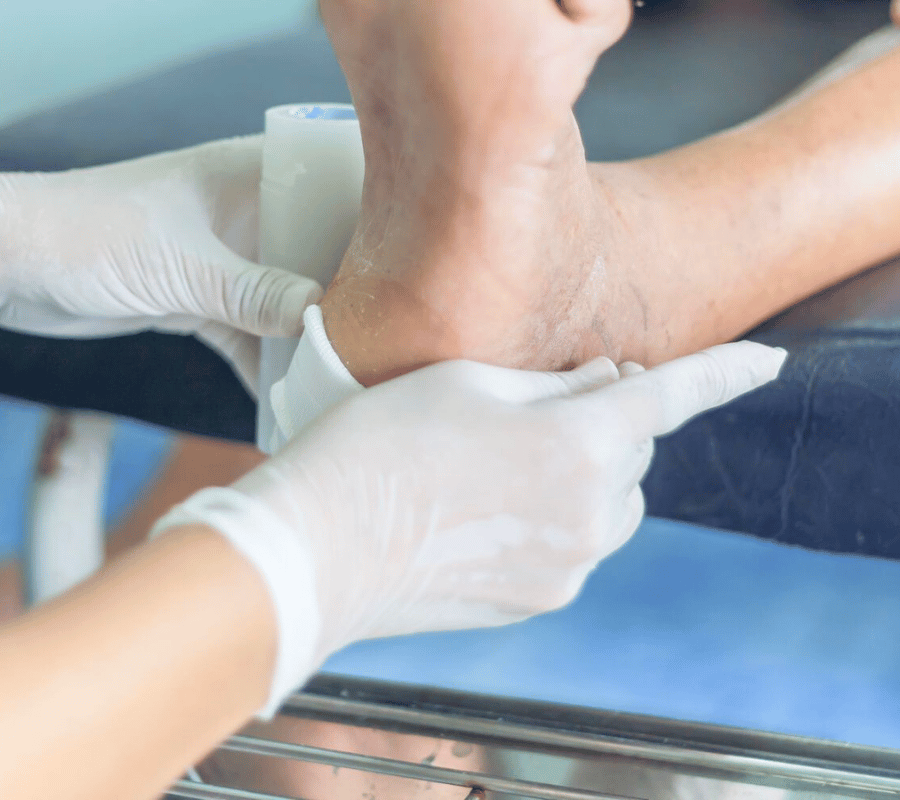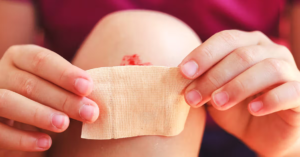Diabetic wound treatment is essential for patients experiencing foot ulcers, chronic wounds, or slow-healing sores caused by diabetes. Without proper care, these wounds can escalate into serious complications such as infections, gangrene, or even amputation. Kalingap Wound Care Clinic in Quezon City provides expert diabetic wound treatment using advanced medical techniques, patient-centered care, and education to prevent future complications. Their approach focuses on healing, protection, and long-term foot health.
Understanding Diabetic Wounds
Diabetic wounds occur when diabetes affects circulation, nerve function, and the body’s ability to heal. Common types include foot ulcers, pressure sores, and infected wounds. High blood sugar levels can damage blood vessels, reducing oxygen and nutrient flow to tissues, which slows healing. Nerve damage, known as diabetic neuropathy, can make patients unaware of small injuries, allowing wounds to worsen without immediate attention. Untreated diabetic wounds carry risks of infection, gangrene, and long-term mobility issues. Comprehensive diabetic wound treatment addresses these risks by combining medical expertise with preventive strategies.
Benefits of Professional Diabetic Wound Treatment
Receiving professional diabetic wound treatment at Kalingap Wound Care Clinic provides numerous benefits. Proper wound care techniques support faster and more effective healing, while infection control prevents complications that could lead to hospitalization. Pressure management and offloading strategies, including specialized footwear, reduce strain on affected areas, allowing tissue to regenerate properly. Improved circulation through medical interventions and careful monitoring enhances recovery. Long-term guidance on foot care, blood sugar management, and preventive measures ensures that patients maintain healthy feet even after wounds have healed.
Who Should Seek Diabetic Wound Treatment
Diabetic wound treatment is essential for patients showing signs of foot ulcers, chronic wounds, infections, or slow healing. Early symptoms may include swelling, redness, pain, drainage, or numbness in the affected area. Patients with diabetic neuropathy or reduced sensation in the feet are at higher risk, as they may not notice injuries immediately. Individuals with a history of foot ulcers or diabetes-related infections should also consider professional care to prevent recurrence. Prompt diabetic wound treatment minimizes the risk of complications, ensures faster healing, and preserves overall mobility.
Diabetic Wound Treatment Process at Kalingap Wound Care Clinic
Kalingap Wound Care Clinic follows a structured, patient-focused approach to diabetic wound treatment. Each step is designed to promote healing, prevent complications, and empower patients with knowledge for long-term care.
Comprehensive Assessment: The first step involves a detailed evaluation of the wound, including size, depth, and severity. Circulation, nerve function, and overall foot health are assessed to develop a customized treatment plan. A thorough assessment helps identify risk factors and determines the most effective approach for diabetic wound treatment.
Wound Cleaning and Debridement: Dead or infected tissue is carefully removed to prevent infection and support healing. Wound cleaning ensures a sterile environment and prepares the tissue for advanced treatment. Proper debridement accelerates recovery and is a critical component of effective diabetic wound treatment.
Specialized Dressings and Offloading: Protective dressings are applied to maintain a moist and safe healing environment. Offloading strategies, such as cushioned footwear or assistive devices, relieve pressure from the affected area. These measures prevent further injury and allow tissue to repair efficiently. Specialized dressings also help manage exudate and reduce the risk of infection, supporting faster wound closure.
Infection Control: Regular monitoring of the wound ensures early detection of infection. If required, targeted antibiotic therapy is administered to treat infections promptly. Maintaining strict infection control is a vital part of diabetic wound treatment, reducing the likelihood of severe complications and hospitalization.
Patient Education: Education empowers patients to participate actively in their recovery. Guidance includes daily foot care routines, proper footwear selection, and blood sugar monitoring. By understanding how to prevent injuries and manage risk factors, patients can reduce the chance of future wounds and maintain long-term foot health. Diabetic wound treatment is most effective when combined with consistent self-care practices.
Patient Education and Aftercare
Long-term success in diabetic wound treatment depends on proper aftercare. Kalingap Wound Care Clinic emphasizes education on daily foot hygiene, checking for cuts, blisters, or swelling, and keeping feet clean and dry. Patients receive recommendations for supportive footwear that protects the feet and reduces pressure. Blood sugar management is reinforced as a critical factor in wound healing, along with guidance on diet, exercise, and medication adherence. Regular foot examinations allow early detection of problems and timely intervention, reducing the risk of recurring wounds or infections.
Why Choose Kalingap Wound Care Clinic
Kalingap Wound Care Clinic is trusted for diabetic wound treatment because of its expert team, advanced medical techniques, and patient-centered care. The clinic provides high-quality treatment that is both affordable and effective. Personalized care plans focus on comfort, long-term recovery, and prevention of future complications. The clinic’s location in Quezon City offers convenient access to specialized care, ensuring patients receive timely attention when diabetic wounds arise.
Schedule a Consultation at Kalingap Wound Care Clinic
Professional diabetic wound treatment at Kalingap Wound Care Clinic ensures advanced care, effective healing, and long-term foot health. The clinic’s dedicated team provides customized treatment plans, infection control, pressure management, and patient education. Contact Kalingap Wound Care Clinic in Quezon City to schedule a consultation and receive expert care tailored to your needs.
Frequently Asked Questions (FAQ)
How long does diabetic wound treatment take?
The duration of treatment depends on wound severity, patient health, and adherence to care plans. Minor wounds may heal within weeks, while complex ulcers can require several months of continuous care and monitoring.
Can diabetic wounds fully heal?
Yes, with proper professional care, infection management, and consistent self-care, most diabetic wounds can heal completely. Early intervention improves the chances of full recovery.
What preventive measures should patients take?
Daily foot inspections, proper hygiene, supportive footwear, and blood sugar control are key preventive measures. Avoiding walking barefoot and promptly addressing minor injuries reduces the risk of developing ulcers.
How often should patients visit the clinic?
Follow-up visits depend on wound severity and treatment progress. Initially, frequent monitoring may be required, gradually reducing as the wound heals. Regular check-ups help prevent recurrence and complications.
When should I seek immediate care?
Seek urgent medical attention for severe pain, signs of infection (redness, swelling, pus), foul odor, fever, or rapidly worsening wounds. Prompt intervention is critical to prevent serious complications.






